How to Use Role-Playing Games for Autism Social Learning
Enhancing Social Skills in Autism Through Structured Play

Transformative Strategies for Autism Social Skills Development
Role-playing games (RPGs) are emerging as powerful tools in supporting social skills development among children and adolescents with autism spectrum disorder (ASD). When thoughtfully integrated into therapeutic and educational settings, RPGs foster communication, empathy, cooperation, and emotional regulation. This article explores effective methods, benefits, adaptations, research evidence, and resources for utilizing role-playing games to enhance social learning for autistic individuals.
Effective Role-Playing Scenarios for Autism Social Skills Development
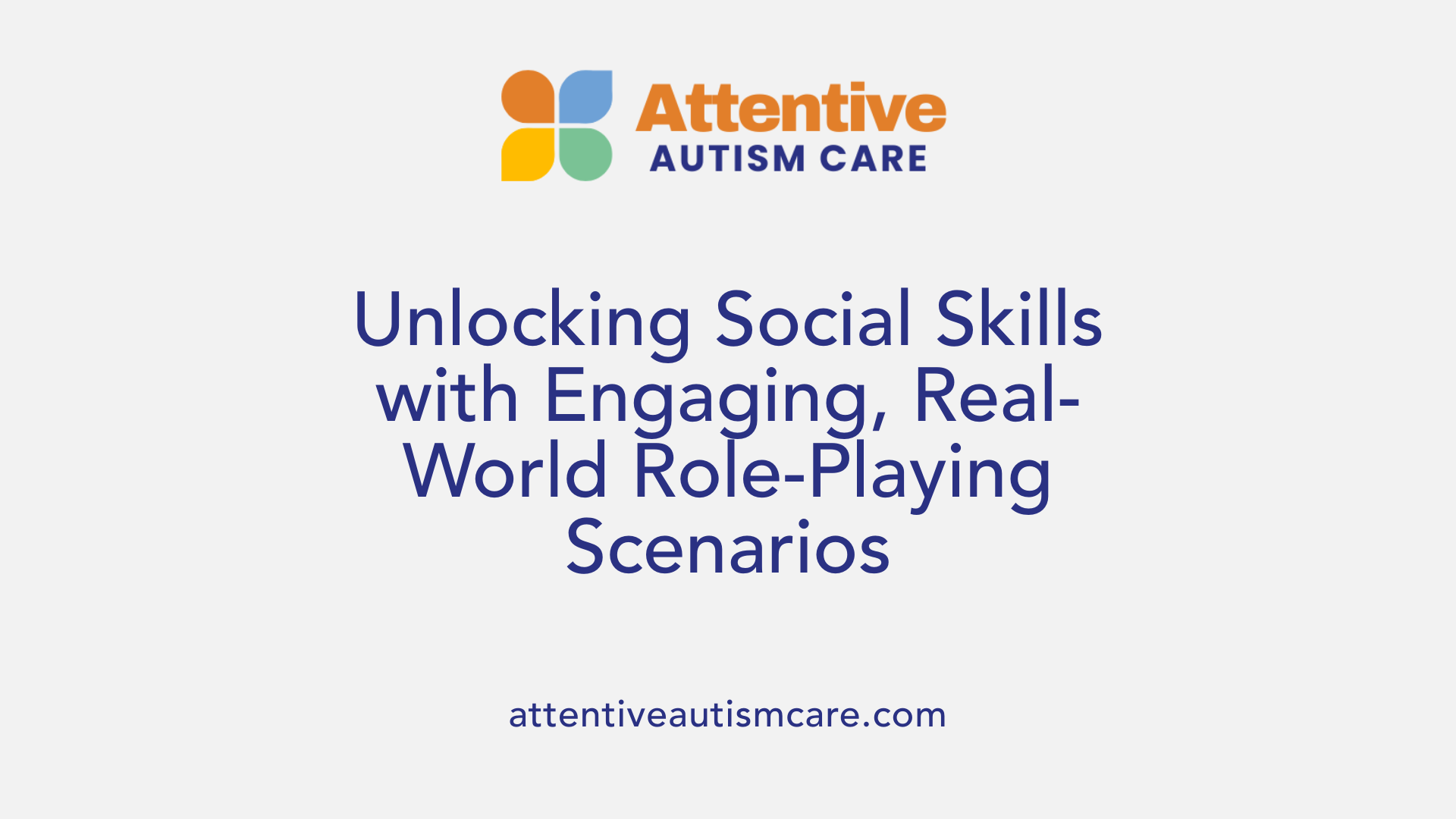
What are effective role-playing scenarios for developing social skills in children and adolescents with autism?
Role-playing is a valuable method for teaching social skills by simulating everyday interactions in a controlled setting. Effective scenarios often include practicing common social exchanges such as greetings, sharing, taking turns, and respecting personal space. These foundational skills help children navigate social environments with confidence.
To make role plays relevant and engaging, professionals tailor scenarios to individual needs. For example, children might practice ordering food at a restaurant, visiting the doctor’s office, or initiating small talk with peers. Scenarios can also include conflict resolution or understanding personal boundaries, providing comprehensive social skills training.
Using tools like scripts, visual supports, and social stories supports children in understanding expected behaviors. Scripts provide a clear framework, while visual aids can depict facial expressions, gestures, and social cues that are critical for comprehension.
Modern technology enhances these experiences. Virtual reality environments and interactive apps create immersive experiences that simulate real-world settings safely. For example, VR can simulate crossing a busy street or navigating a school hallway, helping children practice responses in a realistic, stress-free environment.
Facilitation by trained professionals is essential to guide these role plays effectively. They create a safe space where children can practice, make mistakes, and learn without judgment. Using tools such as puppets, video recordings, and peer-mediated strategies bolsters learning by providing varied and engaging ways to reinforce skills.
It is also crucial to focus on emotional regulation and non-verbal cues during these activities. Recognizing facial expressions, body language, and tone of voice helps children interpret social signals, which is vital for genuine social interactions.
Structured simulations such as problem-solving scenarios—like resolving a disagreement or asking for help—prepare children for real-life challenges. These role-plays empower children to handle social situations proactively and with confidence, ultimately promoting better social integration and emotional well-being.
Benefits of Role-Playing Games for Autism Social Learning
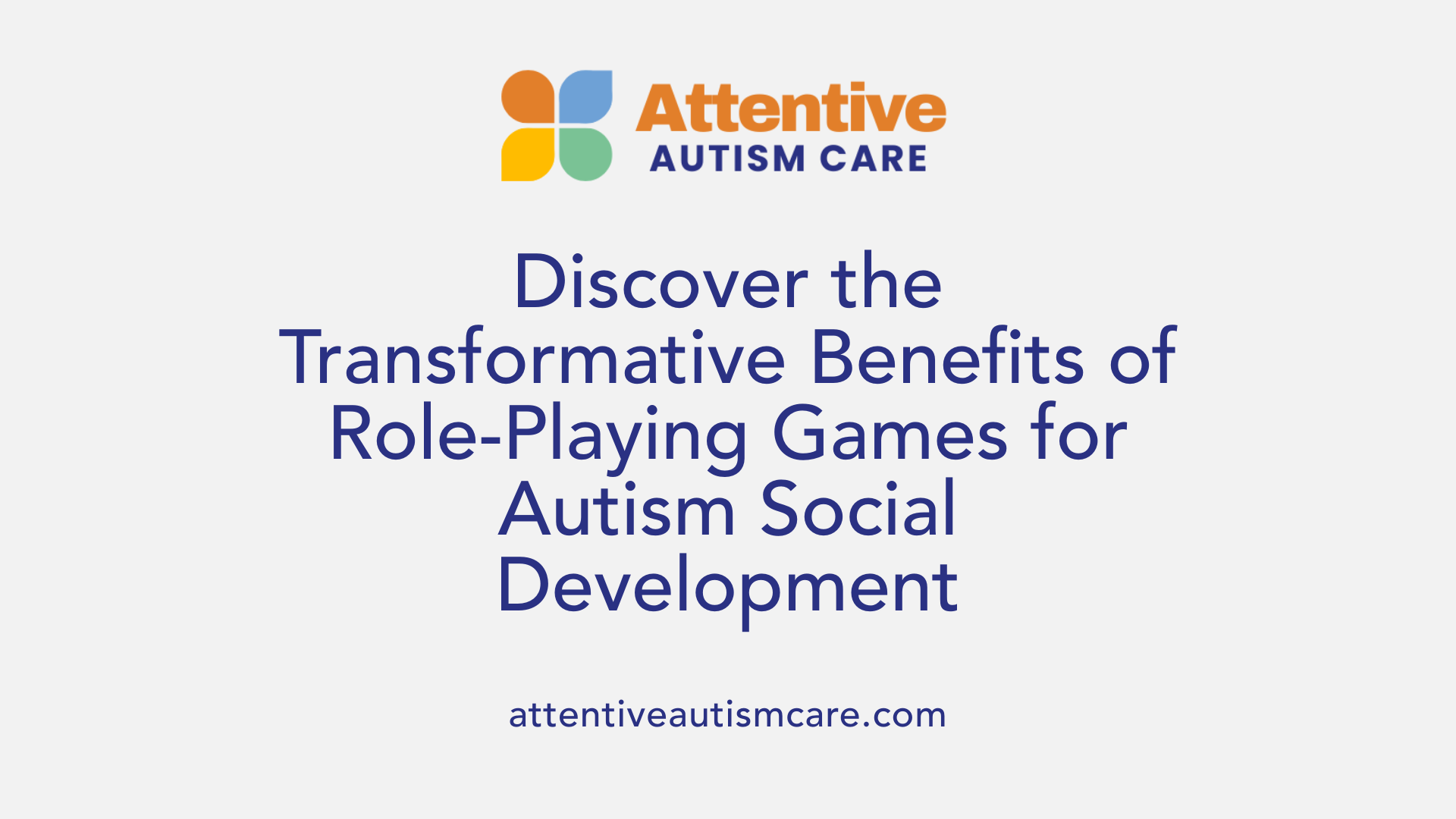
How do role-playing games enhance social understanding, including empathy and social reciprocity?
Role-playing games (RPGs), such as Dungeons & Dragons and Guild Chronicles, provide immersive environments where children with autism can practice social cues and develop empathy. These games encourage players to adopt diverse characters and perspectives, fostering perspective-taking skills—an essential aspect of understanding others’ feelings and intentions. Through storytelling and collaborative decision-making, participants learn to recognize social reciprocity, like sharing ideas, supporting teammates, and responding appropriately to social cues.
In what ways do RPGs improve communication skills and social interaction?
These games actively promote verbal and non-verbal communication by requiring players to articulate ideas, negotiate roles, and react to others’ actions. The structure of RPGs, which often involves turn-taking and strategic dialogue, helps children practice conversational skills in a low-pressure, engaging setting. As players collaborate on quests and solve problems, their social interaction skills—such as listening, articulating thoughts, and expressing emotions—are naturally reinforced.
How do RPGs offer a safe environment for practicing cooperation, advocacy, and emotional recognition?
Unlike traditional social skills training that may focus solely on normative behaviors, RPGs create a controlled, predictable setting where children can experiment, make mistakes, and learn without fear of judgment. Cooperative gameplay emphasizes shared goals, collaboration, and mutual support, encouraging children to advocate for their ideas and recognize their teammates' emotions. Visual aids, scenario scripts, and facilitator support further ensure a safe learning environment.
Can RPGs foster neuroplasticity and emotional development through perspective-taking?
Yes. The process of embodying different characters and navigating diverse scenarios stimulates brain flexibility and adaptive thinking. This perspective-taking is linked with neuroplastic changes that support emotional growth, including increased empathy and self-awareness. The interactive nature of RPGs helps children understand and regulate their emotions better by simulating real-life social challenges.
What is the impact of RPGs on reducing loneliness and increasing confidence?
Children participating in RPGs often report feeling more connected and less isolated. The collaborative aspect of gameplay fosters friendships and social bonds, reducing feelings of loneliness. Many learners experience increased self-confidence as they successfully navigate social scenarios and receive positive reinforcement from peers and facilitators. Participants frequently mention feeling more prepared and self-assured in real-world social situations.
How do RPGs provide an enjoyable and engaging learning experience that promotes emotional regulation and social connectedness?
The game-based approach makes social skills learning fun and engaging, which boosts motivation and attention. The interactive storytelling and role-playing aspects appeal to children’s imagination and creativity, transforming learning into an enjoyable adventure. This positive experience often leads to better emotional regulation, as children learn to cope with frustration and excitement within a structured, supportive environment. Moreover, the shared activity enhances social bonds, creating a sense of belonging and community.
| Benefits | Description | Supporting Evidence |
|---|---|---|
| Enhanced social understanding | Development of empathy and reciprocal social skills | Role-playing fosters perspective-taking and social reciprocity |
| Improved communication skills | Practice in verbal and non-verbal interactions | Games encourage expressive language and listening |
| Safe social environment | Supportive space for trial and error | Facilitators and visual aids ensure comfort |
| Neuroplasticity and emotional growth | Flexible thinking and emotional awareness | Perspective-shifting exercises stimulate brain development |
| Reduced loneliness | Building friendships and social bonds | Collaborative gameplay increases social involvement |
| Increased confidence | Successful social interactions enhance self-esteem | Positive reinforcement and mastery experiences |
| Fun and engagement | Motivating, imaginative learning process | Storytelling and role-play make skills enjoyable |
Overall, utilizing RPGs in autism social learning leverages the engaging, adaptable, and supportive nature of these games to foster meaningful social, emotional, and communication skills. Their ability to simulate real-world interactions within a safe, structured framework makes them invaluable tools in enhancing the social lives of individuals on the autism spectrum.
Implementing and Adapting Role-Playing Games for Autism Interventions
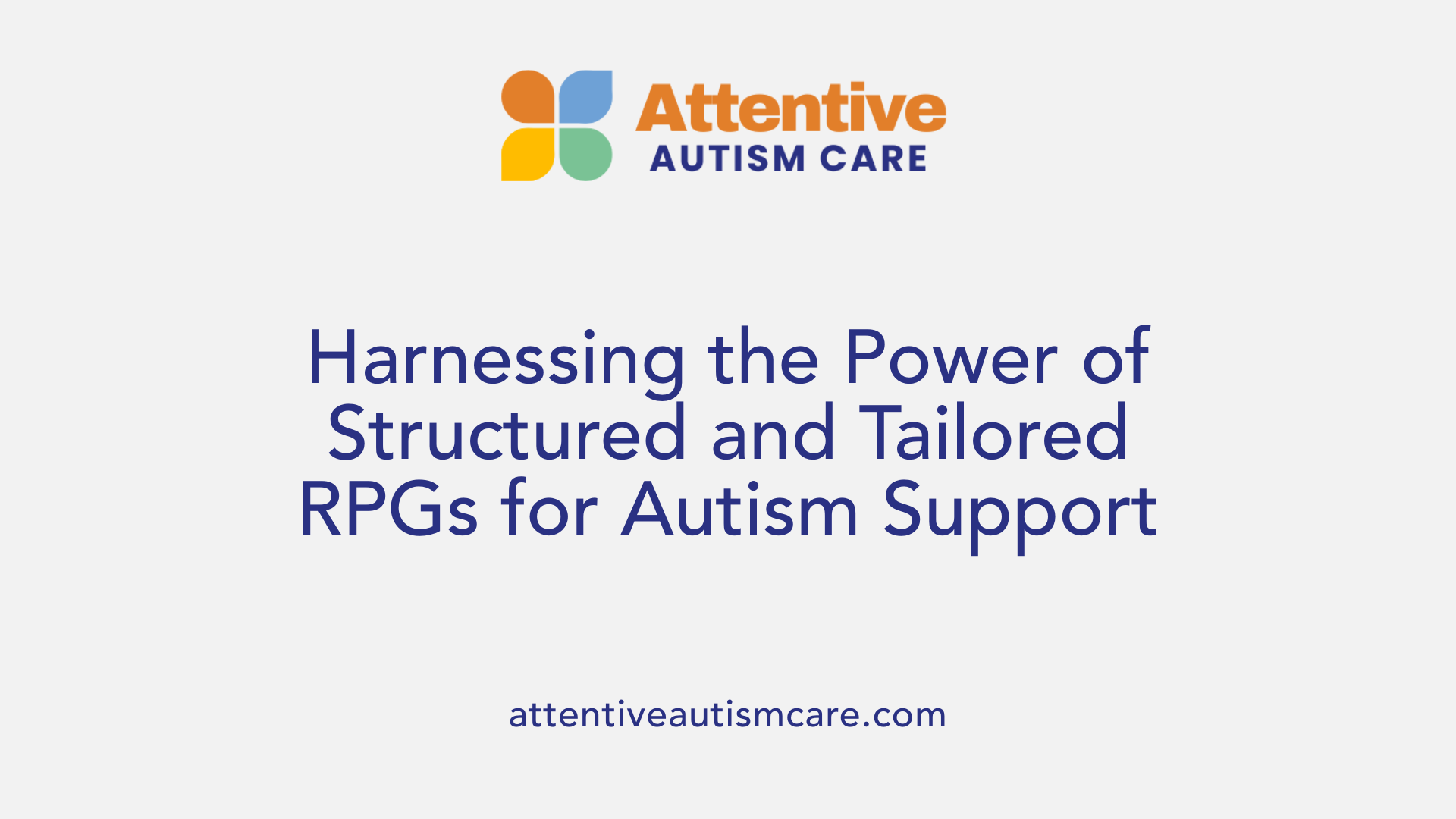
How can role-playing games be implemented and adapted for autism social skills interventions?
Role-playing games (RPGs) serve as powerful tools for enhancing social skills among children with autism spectrum disorder (ASD). To implement them effectively, it is essential to develop structured, narrative-driven scenarios that closely mirror real-life social interactions. These scenarios help children practice skills like communication, cooperation, and empathy in a safe, controlled environment.
Adapting RPGs involves multiple strategies to meet individual needs. Visual supports, such as picture cards or social stories, aid understanding. Simplified scripts provide clear guidance on social responses, reducing uncertainty and cognitive load. Sensory accommodations, like noise-canceling headphones or quiet spaces, ensure comfort for sensory-sensitive children.
The involvement of caregivers, teachers, or therapists is critical for facilitation and support. These adults help scaffold interactions, model appropriate responses, and provide feedback. Incorporating themes of resilience, internal conflict, or personal growth can deepen emotional engagement and foster emotional processing. Such themes resonate with autistic individuals, helping them relate the game’s narrative to real-life challenges.
Role-playing scenarios can be integrated into various settings, including schools, clinics, or therapy groups. They are cost-effective, adaptable, and versatile tools suitable for different developmental levels. Modifying rules or simplifying game mechanics ensures accessibility for younger children or those with additional needs.
Using tabletop RPGs like Dungeons & Dragons allows for extensive customization, promoting social and emotional competence within a community of peers. The collaborative storytelling fosters communication, problem-solving, and perspective-taking—skills essential for social integration.
In summary, thoughtful implementation and tailored adaptations of RPGs create engaging, meaningful experiences that facilitate social learning and emotional growth in children with ASD. They offer a safe platform for practicing real-world skills, all within an enjoyable and inclusive environment.
| Strategies for Implementation | Adaptation Techniques | Support Roles | Customization Aspects | Key Benefits |
|---|---|---|---|---|
| Structured narrative scenarios | Visual supports and social stories | Caregivers, therapists, teachers | Simplified rules, sensory accommodations | Enhances social skills, emotional processing |
| Themed stories on resilience | Clear genre conventions | Facilitates engagement | Developmentally appropriate modifications | Builds confidence and social understanding |
| Integration into educational and therapy settings | Scaffolding and prompts | Guide social interaction | Cost-effective, flexible methods | Promotes cooperation and empathy |
| Use of tabletop RPGs like D&D | Community-based, peer interactions | Support emotional and social growth | Tailored rules and narratives | Fosters teamwork, problem-solving |
Research supports the use of RPGs in autism interventions, highlighting improvements in verbalizations, social reciprocity, and emotional awareness. Effective implementation depends on careful planning, adaptation, and involving supportive adults to ensure engagement and success.
Research and Evidence Supporting RPGs in Autism Social Learning
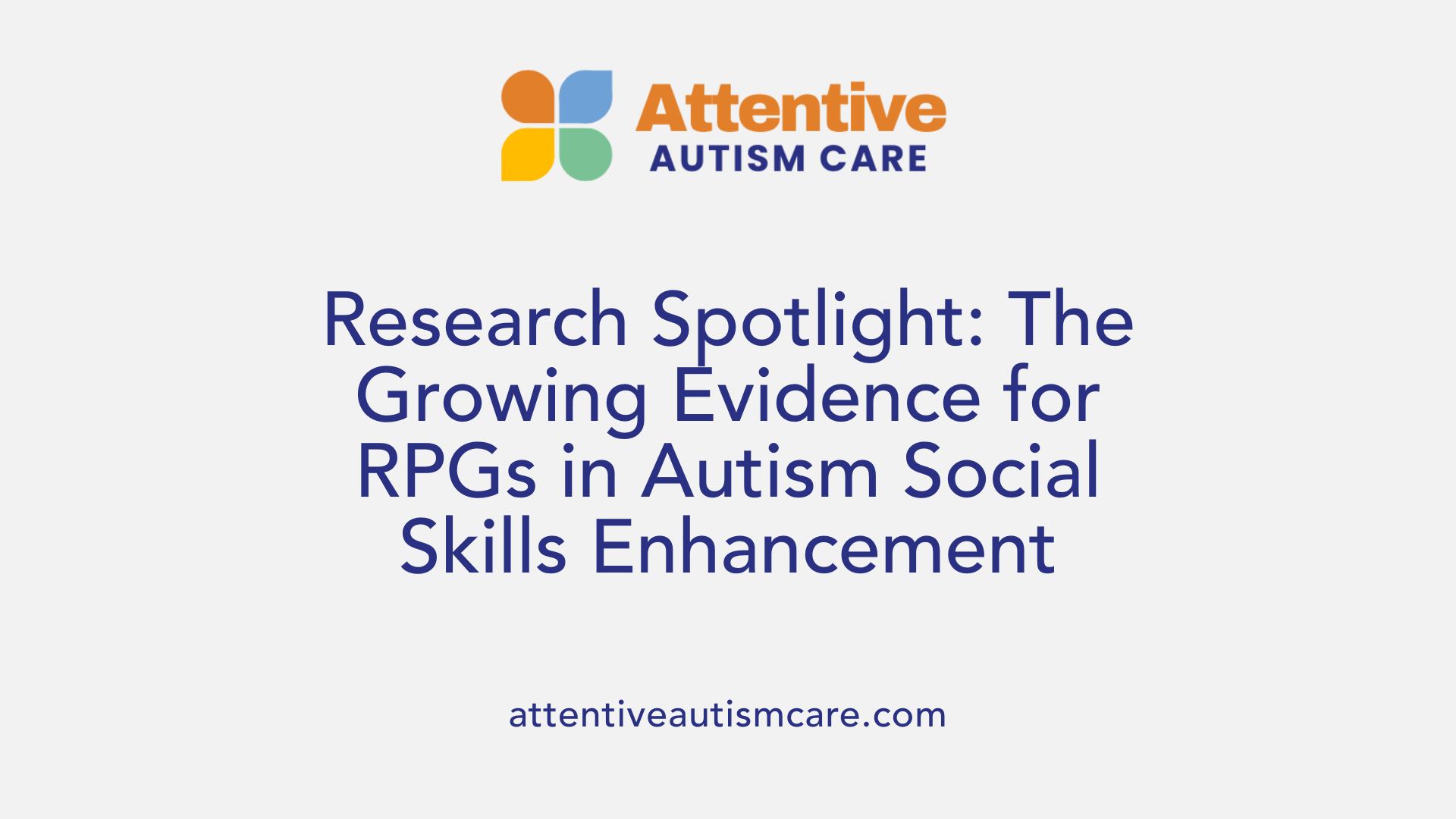
What research or case studies demonstrate the effectiveness of role-playing games in promoting social learning in autistic individuals?
Numerous studies support the positive impact of role-playing games (RPGs) on the social skills of autistic people. One notable research project involved adolescents aged 13 to 17 engaging in tabletop RPGs over a year. The study observed improvements in empathy and social reciprocity, using assessments like the Social Skills Inventory. While some benefits were more pronounced in in-person sessions, both settings showed positive trends.
Jessica Pappagianopoulos, a doctoral student at UVA, conducted a study using her game 'Guild Chronicles,' inspired by Dungeons & Dragons. This game was designed with input from autistic individuals and focused on fostering social-emotional skills through cooperative storytelling. Participants reported better teamwork, increased confidence, and lower feelings of loneliness, noting that they learned social skills indirectly, through enjoying the game.
A systematic review of research involving serious games and virtual environments concluded that most interventions led to improved social skills. These outcomes included better emotional recognition, turn-taking, and collaborative problem-solving.
Current ongoing studies at the Children's Hospital of Philadelphia are exploring the use of RPGs like Dungeons & Dragons for therapeutic purposes. Early findings suggest that such games are well-received and can serve as effective tools for social learning.
Furthermore, online platforms such as Discord have been employed during the COVID-19 pandemic to facilitate remote RPG-based social skills training. These virtual sessions helped maintain or even enhance social interactions, strengthening peer bonds outside of clinical environments.
Qualitative data from participants across these studies reveal increased social confidence, reduced feelings of loneliness, and perceptions that the games are both fun and beneficial. Many participants expressed that they felt more comfortable and successful in real-life social situations after engaging in RPG-based activities.
However, there is variability in how outcomes are measured across studies. While some use pre- and post-intervention assessments, others rely mainly on observational data. This highlights the importance of comprehensive evaluation methods to accurately gauge the effectiveness of such interventions.
Overall, the research evidences that well-structured RPGs and game-based social skills training can meaningfully improve social interaction, emotional understanding, and confidence among children and adolescents with autism. As research continues, these engaging tools are shaping a promising approach for supportive autism interventions.
Resources and Guidelines for Implementing Role-Playing Games in Autism Social Skills Training
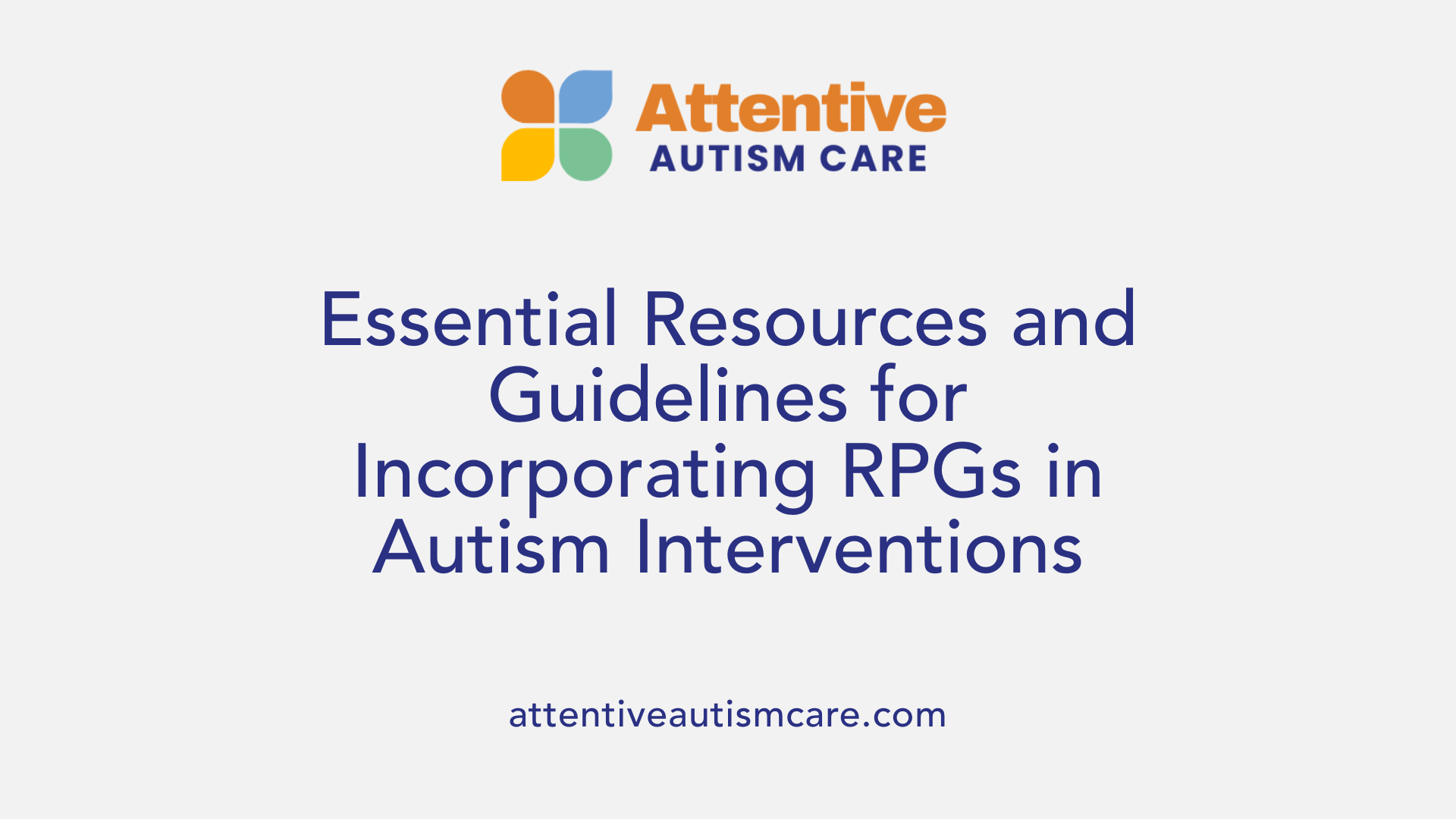
What resources or guidelines are available for educators, therapists, and caregivers to incorporate role-playing games into social skills training for autism?
Implementing effective role-playing activities for children with autism requires access to structured resources and clear guidelines. Numerous online platforms and specialized organizations provide comprehensive curricula, visual scripts, and instructional guides tailored for social skills development. These resources help caregivers and professionals design engaging exercises that simulate real-world social scenarios.
One popular approach involves downloadable materials such as social scenario scripts, emotion charts, and activity sheets. These tools are crucial for creating customized role-playing activities, storytelling sessions, or social communication tasks that suit individual needs. For instance, scripts like 'How Was Your Day?' can serve as simple, effective setups involving both adults and children.
Training workshops and expert-led programs are another valuable resource. They provide practical guidance on implementing role plays, managing group dynamics, and providing feedback. These programs often include demonstrations and hands-on practice, which are ideal for those new to social skills interventions.
Modern technology also supports role-playing with visual aids, video modeling, and digital tools. Visual supports such as picture cards, social stories, and video examples help children understand social cues better. Digital interventions include virtual reality environments, serious games, and online platforms that simulate social interactions in a controlled, predictable manner.
A vital aspect of creating meaningful interventions is involving autistic voices in the design process. Their input ensures that activities are relevant, engaging, and respectful of their unique perspectives. Frameworks like SCERTS (Social Communication, Emotional Regulation, and Transactional Support) and evidence-based approaches guide educators and therapists to develop interventions rooted in scientific principles.
Overall, a combination of organized curricula, visual materials, expert guidance, and inclusive design principles constitute a comprehensive resource base for utilizing role-playing games effectively in autism social skills training. These resources support the development of crucial skills such as empathy, turn-taking, and social communication—laying a foundation for improved social interaction in real-life settings.
Empowering Autistic Individuals Through Play
Integrating role-playing games into autism social skills training offers a dynamic, engaging, and effective approach to building essential social competencies. With careful planning, tailored scenarios, and appropriate resources, educators, therapists, and caregivers can leverage these immersive experiences to foster communication, empathy, and confidence. As research continues to validate the benefits of RPGs, their role in autism intervention is poised to expand, providing meaningful opportunities for social growth in safe and supportive environments.
References
- Role play practice in social skills work for children with ASD. How to ...
- Is there evidence that playing games promotes social skills training ...
- Q&A: Can Role-Play Games Help Improve Autistic Teens' Social ...
- Therapeutic Role Playing Games for Autistic Individuals
- Games That Teach Social Skills to Children with Autism
- Social skills training with a tabletop role-playing game, before and ...
- 10 Amazing Resources for Social Skills Activities for Autism
- Role-Playing Games as Tools for Enhancing Social Sk - Bright Autism




































































































